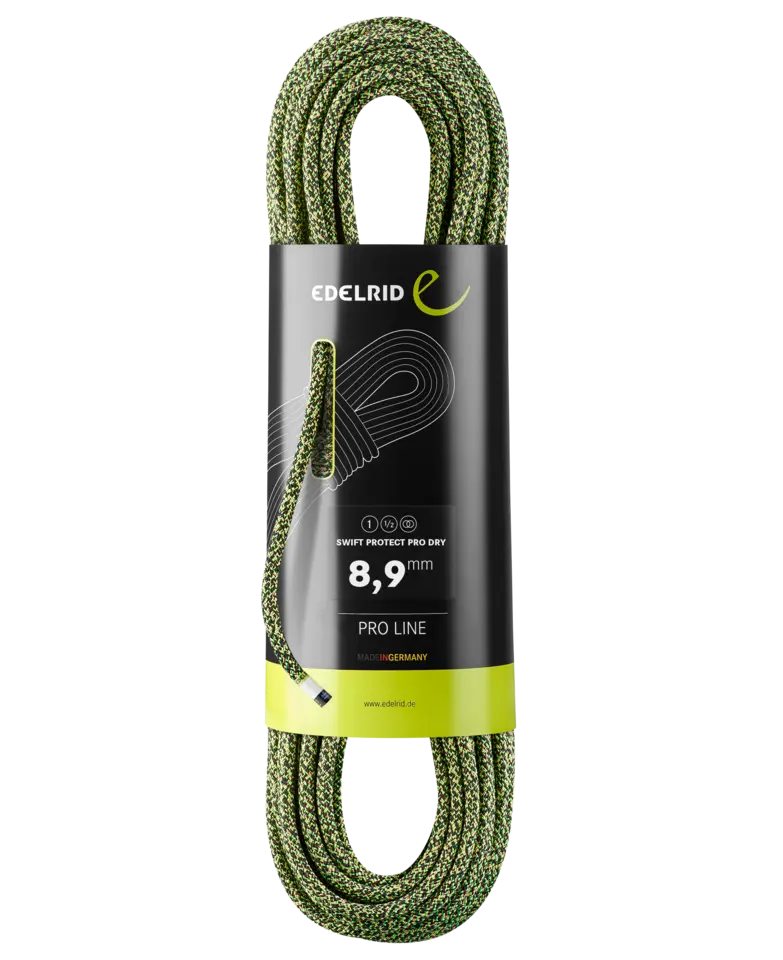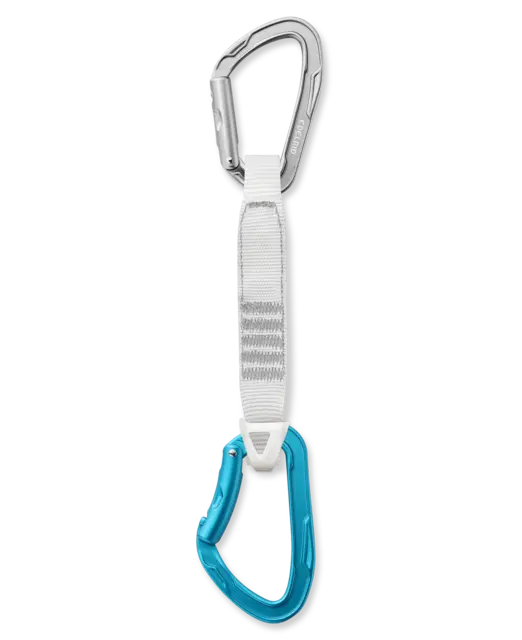The first dynamic single rope with a sheath that includes aramid, for markedly increased cut resistance. Thanks to a special processing method, the Swift Protect Pro Dry remains dynamic. Despite reinforcement with aramid and the overall higher sheath content, the impact force remains within the required standard. These characteristics make the Swift Protect Pro Dry the ideal lead climbing rope and the perfect companion for alpine climbing and mountaineering.
-
Description
-
Features
- Higher sheath content and aramid processing for increased cut resistance under load, e.g. over sharp edges
- Durably water repellent and dirt resistant thanks to the Pro Dry finish
- Water absorption of < 2% far lower than required by the UIAA Water Repellent Test
- Thermo Shield treatment for pleasant handling
- 3D lap coiling enables instant use without tangles
- Certified as a single, half, and twin rope


-
Technical information
- Core proportion: 64 %
- Diameter: 8,90 mm
- Cut value: 30
- Number of falls: 6 / 18 / 30
- Impact force: 9,9 / 7,3 / 11,8 kN
- Sheath proportion: 36 %
- Weight per meter: 53 g/m
- Static elongation: 5,5 / 5,2 / 3,5 %
- Dynamic elongation: 29 / 26 / 25 %
- Certification: EN 892
- Certification: UIAA 101
- Material: Polyamide/Aramid
- Multiple certification
- Sharp edge approved
- Rope Type: Dynamic
- Single Rope
- Double rope
- Twin Rope
- Middle marking
- Impregnation
-
EDELRID technologies
-
PDF downloads
-
Safety instructions & manufacturer information
- This product is part of personal protective equipment (PPE) and/or warnings and safety information are available for this product. Please refer to the instructions for use.
- Manufacturer: EDELRID GmbH & Co. KG | Achener Weg 66 | 88316 Isny i. A. | Germany | www.edelrid.com
Edge load and cutting load with climbing ropes
First the good news: modern climbing ropes can't really tear. In the past 60 years, the German Alpine Association (DAV) has only documented 64 rope breaks. In 53 of these, there were identifiable causes. From the available data, there are four main causes: acid, friction burns, rockfall and edge loads (see Panorama 5/2012).While the first three causes can be generally prevented by proper use and storage, edge loads seem to remain a problem.
The edge does not even have to be particularly sharp.
It becomes particularly problematic when there is a pendulum movement over an edge (e.g. when abseiling or lowering). Then, in addition to the edge load, a cutting load occurs, which can have fatal consequences. The rope is cut through, so to speak. How can we mitigate these risks?
Cut Resistance Technology

At EDELRID we have tackled the problem and developed a rope that has a particularly high cut resistance. This is made possible by the new "Cut Resistance" rope technology. This means high-strength aramid fibers are integrated into the rope sheath during the braiding process. Compared to polyamide, aramid has a significantly higher cut resistance.
The crux: aramid is a particularly static material. Compared to polyamide, it has virtually no dynamic properties. However, in the event of a fall, it is necessary to absorb the resulting energy and thus reduce the impact force to a tolerable level.
In a special production process, we have succeeded in matching the aramid and polyamide fibers in the rope sheath in such a way that we create a rope with particularly high cut resistance, while simultaneously complying with the standard for dynamic mountain ropes.


















